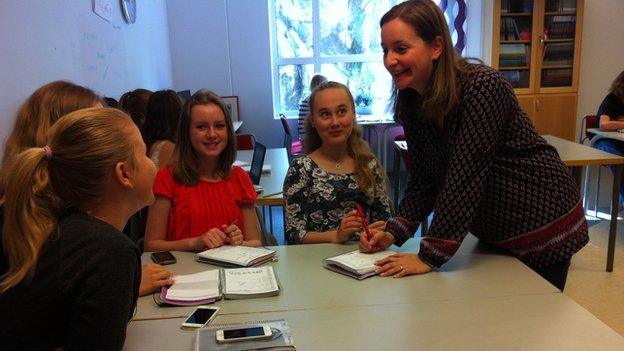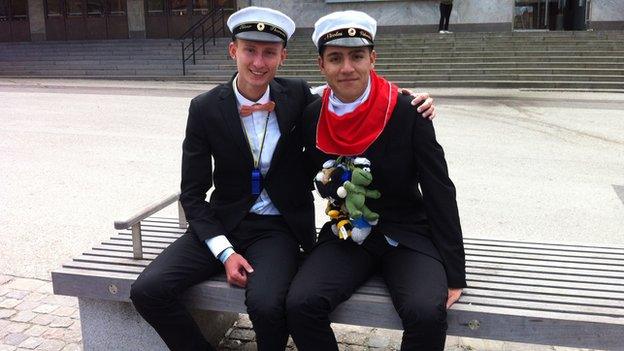Sweden loses top marks for education
- Published

Kunskappskolan runs a chain of schools in Sweden
In Gothenburg's main square I watch as a crowd of rowdy, happy teenagers pile out of the back of a flatbed truck and set off coloured smoke bombs.
All dressed up with jaunty caps, and prom dresses they are celebrating the end of their school days with a parade.
But they are part of a generation which many now fear has been let down by the education system in Sweden.
Where did it all begin to go wrong?
Just half an hour beforehand, I was perched in a science classroom in Gothenburg with Gustav Fridolin, a former teacher, and now Sweden's education minister.
He told me that last year, more students left compulsory schooling than ever before without the qualifications needed to go further.
A series of radical reforms was unleashed on schools in Sweden in the 1980s and 1990s, and the consequences have been unfolding ever since.
Radical reforms
The reforms were once hailed by former Education Secretary for England, Michael Gove, as creating a successful autonomous school system that should be admired.
A system in which, he said, "the old bureaucratic monopoly that saw all state schools run by local government, external" had been ended.

Celebrating the end of formal schooling with a parade is a Swedish tradition
It was part of the inspiration for free schools that have been set up set up in England, independent of council control. Another 500 are planned.
But now, as Gustav Fridolin freely admits, the Swedish education system is in crisis after falling faster and further than any other country in international tests in science, reading and maths.
"It's urgent, we're losing money every day, it's the biggest issue for the Swedish economy."
He says there is little agreement about which of the many changes in the 1980s and 90s is most to blame.
Sweden created a system with more choice for parents by giving them vouchers to spend in whichever school they want.
Decentralisation
More competition was created by allowing free schools to be opened by independent organisations.
At the same time there was massive decentralisation, with much more responsibility being handed to the municipalities.
Gustav Fridolin: "It's the biggest economic risk for Sweden today"

Sweden v UK:
Scores on the 2012 international PISA tests, comparing educational achievement in OECD countries:
Reading:
UK 23
Sweden 36
Maths:
UK 26
Sweden 38
Science:
UK 21
Sweden 38

One of the largest and most successful free school organisations is Kunskapsskolan which runs 36 schools in Sweden.
It also manages some academy schools in England. The difference is that in Sweden it is allowed to make a profit.
When I visit, it is near the end of term and there is a relaxed, and very boisterous atmosphere.
The teachers tell me their results are good because pupils here are involved in setting the pace of their learning and their own targets.
Robust defence
And Cecilia Carnefeldt, CEO of Kunskapsskolan, is robust in her defence of free schools, which make up about 16% of the system.
She argues they have encouraged innovation, and allowing parents to use their vouchers in a free school or municipal school is a powerful influence on standards at a local level.
"The opportunity for parents to choose a school is really important, that will improve the quality of all schools where there is healthy competition."

Michael Gove was a fan of the Swedish reforms
An OECD review, external published earlier this year found the decline in standards was across all kinds of schools.
International observers found a lot of low-level disruption and, in some parts of the school system, a lack of ambition.
Teachers' pay is less than other graduate professions, and after all the criticism, morale is low.
All issues which will be looked at over the next two years by a recently created Schools Commission which will suggest changes.
Anna Ekstrom, director general of the Swedish National Agency for Education, is leading it.
"You need to have a feeling among children, among parents, among teachers that school is important. If you don't have that feeling it's very difficult to achieve higher results so I think this is maybe an area where we need to work a little bit harder in Sweden."
It's the closest she comes to admitting there may have been complacency.
More effort
Already many schools are putting more effort into teaching maths and science.
In a classroom in a municipal school in Stockholm Janna Malmgren is helping her class of pupils test bridges they have designed and built.
Each bridge is loaded with weights until the point of collapse.
Janna, who has been teaching for two years, says many are put off by a lengthy training not matched by the pay that follows.
"I can't speak for other people but I do think salary might have something to do with it, workload, definitely you hear about teachers' workload, they work so much."
Nina Jonsson, the head teacher here at the Sodermalmsskolan, accepts that results can't be ignored.
Branwen Jeffreys talks to Swedish teachers about the country's education system
"We need to set high standards, we need to be tough on truancy and tardiness for example. "
But she says the international tests are only part of the picture.
"I think they fail to capture our innovativeness. Look at Skype, Spotify for example, they're all from Sweden. We weren't born that way, it comes from somewhere. "
In this she is in agreement with Cecilia Carneveldt from Kunskappskolan, who says they've had visitors from South Korea who want to understand how to foster creativity.
Andreas Schleicher, who leads the Directorate for Education and Skills at the OECD, is familiar with the arguments about their Pisa tests.
He says one of their innovations has been a shift from testing what students know, to what they can do with that knowledge.
These are skills which many global businesses require.
Business partnerships
The British-Swedish pharmaceutical company Astra Zeneca AB has just begun a collaboration with the world famous Karolinksa medical research institute.
At its launch Jan-Olof Jacke, president of Astra Zeneca AB, mingles with the scientists. He is a parent as well as a businessman.
He tells me what matters is that Sweden finds a way to start improving its education system now, so businesses can recruit in the future.
"As a knowledge economy, with a very significant part of our GDP coming from export, over 50%, that starts with good education. "
The latest round of Pisa tests is being carried out this year for publication in 2016.
Anna Ekstrom says the Schools Commission has been given two years to do its work, but she too understands the urgency.
"We are a small country, we live on the north pole, we really have to rely on high quality products and high quality export so for that reason the school results are very important for us."
There are real differences between Sweden and England, not least the stronger inspection regime of Ofsted.
It is also clear that the lessons from Sweden may be far less clear-cut than either the supporters or opponents of free schools would like to argue.
- Published1 June 2015
